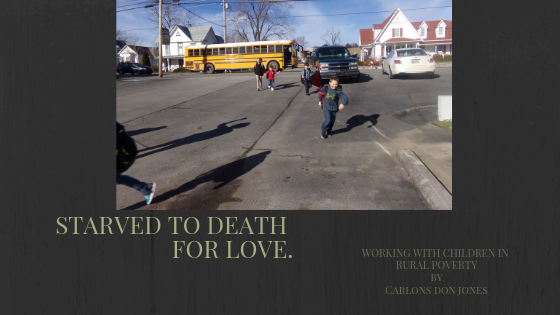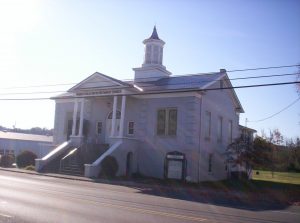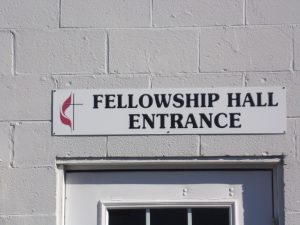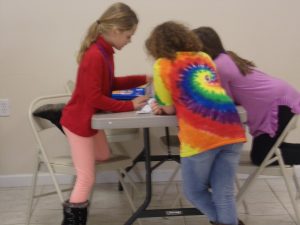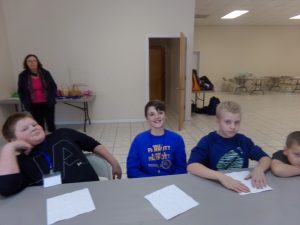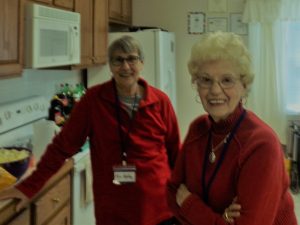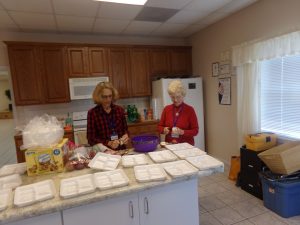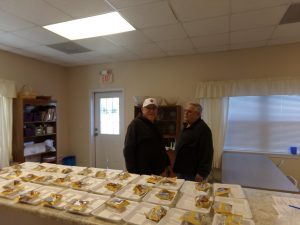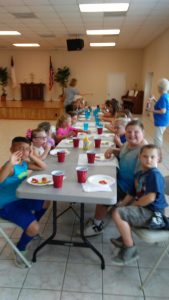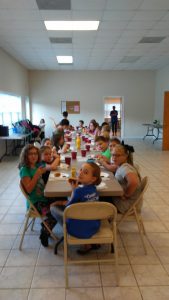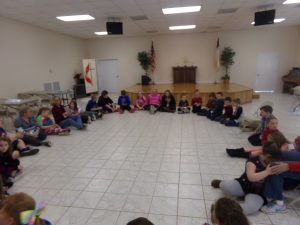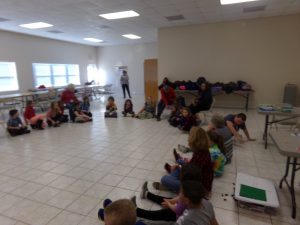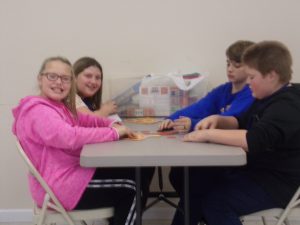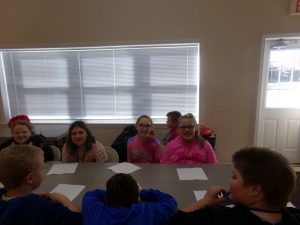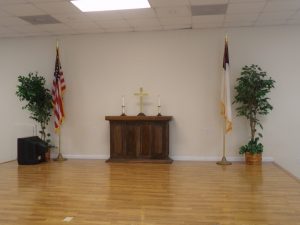I was not surprised. It occurs often enough when one is in ministry. There is a question that bothers many people who are not connected (or are loosely connected) to a church. The question arises in any and every context. This time it was a treatment facility. God is a topic in hospitals, hospices, and drug and alcohol treatment facilities. “Why do churches need…?” You can fill in the blank. Why do churches need (buildings, money, paid clergy and/or staff)? I did not answer the question directly. There was time. I told instead about a ministry called Wonderful Wednesday.
Wonderful Wednesday is an oft-used title. This program is an after-school program in Parrottsville, Tennessee. The area is impoverished with many social ills that plague all areas in rural poverty. These ills are substance addiction, a high incarceration rate, the related issue of people incapable of escaping the system, and broken familial relationships. In fact, many grandparents of the children enrolled in Wonderful Wednesday are the primary caretakers of the children. Its’ location in southern Appalachia only enhances the problem because of the community’s proximity to the Great Smokey Mountains National Park – the most visited national park in the United States. This is a community that few tourists come to or know about. In the present political jargon, this is a forgotten community of forgotten people.
There are many churches in Cocke County, Tennessee. The last count from First Baptist Church of Newport, the county seat, is sixty-five congregations. A few of the churches are large. Most of the churches are small congregations almost what could be called “family chapels.” Parrottsville United Methodist Church shares a pastor with Harned’s Chapel United Methodist Church because both are small churches. When one compares the number of churches with the number of communities in the county, we see an appalling record of ineffectiveness. The problems are enormous leaving congregations and their pastors in despair.
Parrottsville United Methodist Church was in that way too. And then the newly appointed pastor approached the County Mayor and asked what the church could do in its’ community. The Mayor was astonished and declared, “No pastor has ever asked that question before.” Wonderful Wednesday was born from that conversation.
WHO IS SERVED?
The students who participate (at the present time about 45) are from the classes of Kindergarten thru the Fifth grade at Parrottsville Elementary School. The program is open to any student whose parents or guardians wish to send them. The program does not take into account family income, religious affiliation, or even school attendance. Home-schooled students or students from other schools are welcome. Transportation is provided by the parents. Two of the school buses from Parrottsville Elementary School drive by the Parrottsville UMC Annex Building. A volunteer usually meets the buses.
WHO SERVES?
The staff of Wonderful Wednesday are volunteers. They are mostly retired teachers who are members of the congregation. Church membership is not a requirement to be eligible to volunteer. But all volunteers must meet the Safe Sanctuaries guidelines adopted by the congregation.1 High School age volunteers are welcomed and carefully observed. They are able to meet their community service requirements for graduation from Cocke County High School. The Pastor of the congregation usually takes part in some capacity in the program too. One of the volunteers gave this blog its’ title. She observed many of the children who were hungry for attention. She said, “they are just starved to death for love.”
WHAT HAPPENS?
First, we shall look at those actions that make up the program for Wonderful Wednesday. It is a simple schedule of activities. The students arrive and begin with a snack/meal of an entrée (hot dogs, pizza, or a sandwich depending on the day), a drink, fruit, and cookies. The snack meal is followed by a time for homework help or playing indoors (board games, puzzles, coloring, or a craft), followed by Circle which is a time for story and prayer. This time of spiritual nurture is followed by playing outdoors if time and weather permits. These important activities are what one sees happening. The question remains is something happening in the lives of the students?
DEVELOPING SPIRITUALITY
The actual work of a Church-based After School program is what happens to the inner life of the student. Historically a civic After School program has as its’ goal “to help children feel valued and recognized, to provide an alternative to a ‘negative identity.'”2 This is a good work that proves effective. Adding a Christian perspective allows the program as the Manna Program in Fort Worth states, “to help students develop spiritually by addressing needs for spiritual growth through providing opportunities to assist others by participating in community service events and by leaders modeling and teaching positive character traits from a Christian foundation.”3
An example of this working was witnessed by a teacher at the end of the school year a few years ago. A student was injured during an all school activity. When he was rushed to the hospital the students younger sister was left at school. Understanding she was visibly upset, some of the students who participate in Wonderful Wednesday decided the best way to comfort the other child was to pray for her and her brother. They used the method they learned in the program. The group of students invited others including a teacher to stand together in a circle holding hands praying about the concern. They shared their spirituality. The teacher later told how she was moved by this simple action of faith.
DEVELOPING SPIRITUALITY AND THE BIBLE
The scripture text of Deuteronomy 6::20-24 considers the point that one day the children will ask what the meaning of the commandments are? In other words, children in ancient times like modern children asked “Why?” An answer was given. Israelites are liberated slaves living in a land God gave to them. Earlier the text calls on the people of the land of Israel to “love the lord God with all your heart, and with all your soul, and with all your might.” A note in the Wesley Study Bible reads, “this commandment to love God is so important to salvation that, for Wesley, parents must teach it to their children frequently, diligently, and earnestly by recitation and oral, visual, and written means so that it pierces their heart.”4 Elizabeth Caldwell adds this thought, “if we encourage their question and curiosities about God and the world, we will help them with a growing sense of autonomy. And the opposite happens if we refuse to allow their questions that are the foundation for their growing sense of a healthy self”5
It was a child’s statement that brought me to this task. She arrived late one afternoon. I told her I had been concerned. She replied, “I am not going to miss Sunday school.” Her experience in Wonderful Wednesday associated her time there with what happens at church on Sunday. This student did not attend Sunday School or Church on a regular basis. Our District Superintendent referred to Wonderful Wednesday as the third congregation on the charge. The basic question I had in doing this research was how do the children in Wonderful Wednesday think about church? The importance of developing their sense of God, Spirituality, and the knowledge of Scripture in their lives is being recognized in the practices of the program. The children demonstrate an understanding of church as a community centered on these three attributes is how they define the church. Church is a place for God’s presence, fellowship, and comfort.
CONCLUDING STORY
My friend whom I referenced at the beginning received my description of Wonderful Wednesday with these words. “That’s the kind of thing churches should be doing!” I replied, “You are right. But, it could not have been done without having the proper facilities with which we could offer the program.” He nodded. “I see.” He said still having a look of consideration on his face.
1Sprouse, Ruth. Safe Sanctuaries for Small Membership Congregations. (Nashville: Discipleship Ministries: The United Methodist Church) No Date Given.
2Halperin, Robert. “A Different Kind of Child Development Institution: The History of After School Programs for Low Income Children.” Teachers College Record 2002, 199.
3Atkinson, Margie. “Manna After School Program, Bread of Life, Fort Worth TX,” Family Ministry, Winter 2000, 4-5.
4.Green, Joel B. and William Willimon. The Wesley Study Bible (Nashville: Abingdon Press, 2009), 225.
5Caldwell, Elizabeth F., Making a Home for Faith: Nurturing the Spiritual Life of Your Children (Cleveland: The Pilgrim Press), 50-51.
